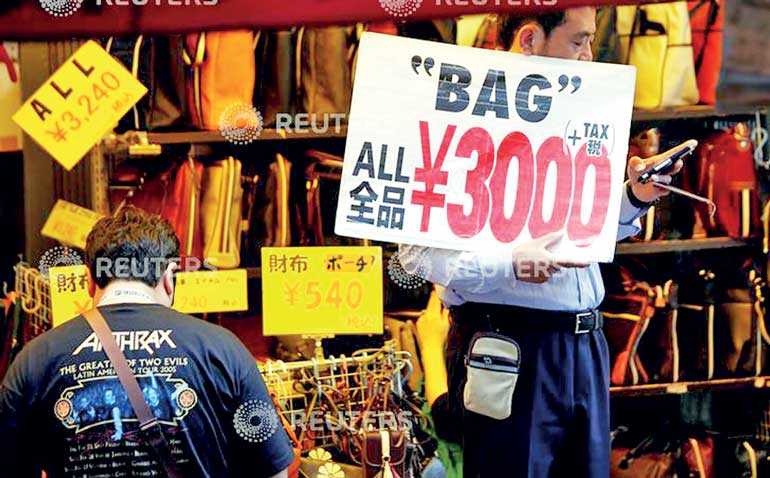Sunday Feb 22, 2026
Sunday Feb 22, 2026
Thursday, 17 May 2018 00:07 - - {{hitsCtrl.values.hits}}

Tokyo (Reuters): Japan’s economy contracted more than expected at the start of this year, suggesting growth has peaked after the best run of expansion in decades, unwelcome news for a government struggling to get traction for its reflationary policies.
The world’s third largest economy shrank by 0.6% on an annualized basis, a much more severe contraction than the median estimate for an annualised 0.2% decline.
The contraction, which was driven by declines in investment and consumption and weaker export growth, comes as Japan Inc frets over the possible effects of US President Donald Trump’s protectionist policies on exports.
It also highlights the central bank’s vulnerability to an economic or financial shock after five years of heavy monetary stimulus has left it with little ammunition to defend growth.
Economy Minister Toshimitsu Motegi said there was no change to the government’s view that the economy was recovering moderately, predicting a resumption in growth to be driven mainly by private consumption and capital expenditure.
“But we need to be mindful of the impact of overseas economic uncertainty and market volatility,” he added.
External demand – or exports minus imports – added just 0.1%age point to first-quarter GDP as imports slowed more than exports. However, a breakdown of the data shows export growth is losing momentum, expanding just 0.6% in the first quarter after growth of 2.2% October-December last year.
Slower export growth reflected a decline in shipments of mobile phone parts and factory equipment in the quarter, a government official said.
This is a concern for Japanese manufacturers because many of these machines and electronic components are sent to China, where they are used to produce goods for export, but this trade is at risk if the Trump administration’s threatened tariffs on Chinese exports go ahead.
Advertising
“Globally, IT-related items have been in an adjustment phase, which weighed down Japan’s exports and factory output,” said Yoshimasa Maruyama, Chief Market Economist at SMBC Nikko Securities.
Economists say Japan’s first-quarter contraction is temporary, but the rebound will not be nearly as strong as previous quarters.
“The economy is not headed for a recession,” said Hiroshi Miyazaki, Senior Economist at Mitsubishi UFJ Morgan Stanley Securities. “However, it is clear that in the long term the pace of growth is slowing.” Wednesday’s data marked the end to eight straight quarters of economic expansion, which was the longest stretch of growth since a 12-quarter run between April-June 1986 and January-March 1989.
Fourth quarter growth was revised to an annualised 0.6%, down from the 1.6% estimated earlier.
Capital expenditure fell 0.1%, down for the first time in six quarters, suggesting corporate investment is not as strong as many economists had expected. The median estimate was for a 0.4% increase.
The capital spending figures may presage data due on Thursday that is forecast to show core machinery orders, a leading indicator of capital expenditure, fell in March for the first time in three months.
Consumer spending fell marginally, registering a decline of less than one percentage point in the first quarter. The median estimate was for consumer spending to remain unchanged.